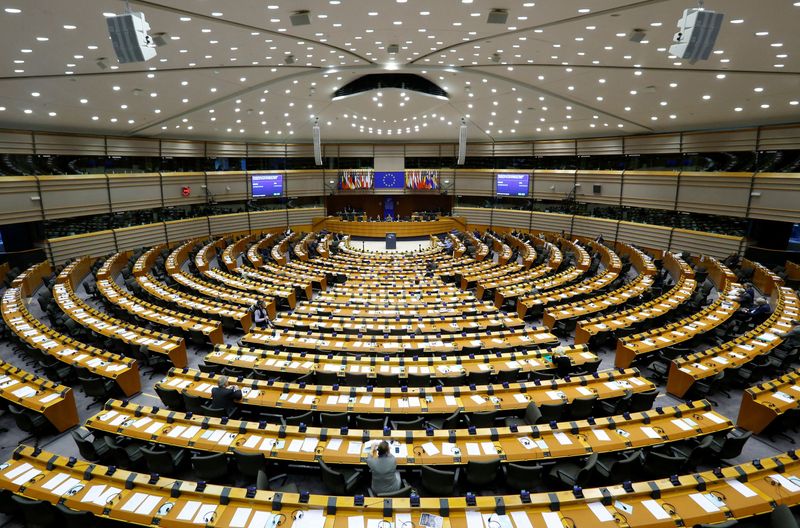By Kate Abnett
BRUSSELS (Reuters) - The European Parliament will vote on Wednesday on a raft of EU climate change policies to cut Europe's emissions over the next decade, with the outcome of the votes still uncertain as lawmakers are split over whether to uphold or weaken the plans.
The plans aim to put the 27-country European Union - the world’s third-largest economy - on track for its goal of reducing net greenhouse gas emissions 55% by 2030, from 1990 levels.
The EU parliament will vote on eight proposals on Wednesday, to confirm its position for negotiations with EU countries on the final legislation.
Members of the parliament are considering hundreds of amendments that could increase or weaken the impact of the EU's climate policies.
One proposal represents the biggest overhaul of the EU carbon market since its launch in 2005. This would reinforce the scheme to cut emissions for the sectors it covers by 61% by 2030, under an original plan by the European Commission. Some lawmakers will attempt to strengthen that to a 67% emissions cut, with others set to back a 63% compromise.
Another proposal key to the EU's climate target would impose a 100% cut in CO2 emissions from new cars by 2035 - effectively banning new combustion engine car sales. Amendments by the centre-right European People's Party (EPP), parliament's biggest lawmaker group, will attempt to weaken that to a 90% CO2 cut.
"We need flexibility for the market and for customers. We shouldn't have bans," EPP lawmaker Jens Gieseke said.
Jan Huitema, parliament's lead lawmaker on the cars proposal, said the 2035 date was crucial because the average lifespan of new cars is 15 years - so a ban any later would prevent the EU having net zero emissions by 2050, the milestone scientists say the world must reach to avert disastrous levels of climate change.
Carmakers including Ford and Volvo have publicly supported the EU plan to stop combustion engine car sales by 2035, but emails seen by Reuters show auto industry groups have lobbied lawmakers to reject the 2035 target, which they say penalises alternative low-carbon fuels.
The lawmakers are also split over options to reject a new EU carbon market imposing CO2 costs on the polluting fuels used in buildings and transport, or to support a scaled back version that would restrict the scheme to the commercial sector, exempting private consumers.
EU climate policy chief Frans Timmermans urged lawmakers to back the policy in full and use the revenue it generates to help vulnerable households switch to clean energy.

A tight vote is also expected on the EU's world-first plan to impose a CO2 levy on imports of carbon-intensive goods like steel and cement, with lawmakers split over how quickly the scheme should replace the free CO2 permits those industries currently receive.
Options up for the vote on Wednesday include a free CO2 permit phase-out by 2030, 2032 or 2035. Industries have urged lawmakers not to pull forward the date, which would hike the price they pay to pollute.